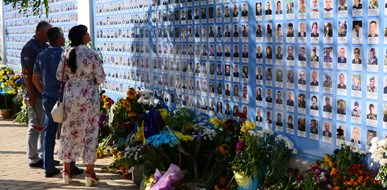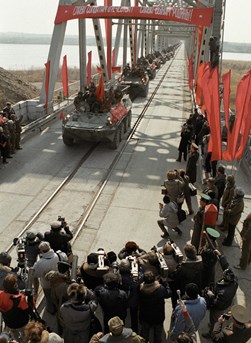[New publication] The road to justice: Lessons for Ukraine from the USSR invasion of Afghanistan
Published 22 February 2023
Copyright: Oleksandr Polonskyi. Kyiv/Ukraine - 08.29.2020: Mourning families of killed in Russian Ukrainian war soldiers bring flowers to the Memory Wall with portraits of their sons and husbands.
The USSR invasion of Afghanistan in the late 1970s and the process towards justice and peace which followed the withdrawal of Soviet troops could provide important lessons for the implementation of transitional justice and respect for the international rule of law following the Russian invasion of Ukraine, conclude Asser Institute Associate Fellows Nader Nadery and Victoria Kerr in a new article in the Security and Human Rights Monitor. The Russian invasion of Ukraine should be seen as a pivotal moment for the international community to demonstrate a renewed commitment to sustainable peace and security, and that includes ensuring justice for the victims.
The USSR left Afghanistan in February 1989 ending a ten-year invasion. While victims’ demand for justice was overwhelming across the country, the focus on peace meant that justice for the victims of the atrocities was never prioritised by authorities and the international community. Thirty-three years later, on 24 February 2022, Russian Federation President Putin announced the commencement of a ‘special military operation’ in Ukraine. Even as the invasion continues, questions remain as to how Ukraine will approach and implement transitional justice.

@ A. Solomonov (Wikimedia) - Withdrawal of Soviet troops from Afghanistan - 15 February 1989
Lessons for transitional justice in Ukraine
Nearly a year after the commencement of the full-scale invasion of Ukraine, authors Nadery and Kerr link their respective expertise in the justice processes in Afghanistan and Ukraine. They highlight that while the invasions can be distinguished in a number of respects, there are nonetheless a number of lessons to be drawn from the past that can be relevant for transitional justice in Ukraine. The Russian rhetoric around the invasion draws on Soviet and imperialistic “greatness”. Firstly, Nadery and Kerr argue that this historical framing of the invasion of Ukraine and the role of the Soviet legacy will be critical to the transitional justice process in Ukraine.
The article also calls for addressing institutional failings throughout military structures to ensure sustainable peace. These failings are illustrative of continued Soviet influence within the Russian army and include the lack of education and training, as well as patriarchal and hierarchal attitudes that are perpetuating brutality. In stark contrast to the approach in Afghanistan, there are unprecedented criminal justice initiatives in the context of Ukraine. However, Nadery and Kerr caution that such initiatives must be effective, coordinated, and led by victims’ interests.
Promoting the international rule of law
While justice for Ukraine should be tailored to its specific context, Nadery and Kerr argue that lessons can be learnt from the response from the international community to the USSR invasion of Afghanistan. The Russian invasion of Ukraine should be seen as a pivotal moment for the international community to demonstrate a renewed commitment to sustainable peace and security, and that includes ensuring justice for the victims.
About the authors
Nader Nadery is a national security fellow at Hoover Institution of Stanford. He was a member of the Peace Negotiation Team for the Afghanistan peace process in Doha, and served as Chair of the independent Civil Service Commission of Afghanistan. Prior to joining the commission, he was a senior advisor to the Afghan president on human rights, and from 2004-2012, he served as a commissioner of the Afghan Independent Human Rights Commission.
Victoria Kerr is an international lawyer and consultant on the Asser Institute & Global Rights Compliance partnered project ‘Strengthening Ukraine’s Capacity to Investigate and Prosecute International Crimes’, funded by the Netherlands Ministry of Foreign Affairs. She also works with REDRESS on sanctions and asset recovery with a view to reparations for victims in Ukraine.
Read more
[New research paper] 'Magnitsky sanctions fail to serve human rights or security'
In a new paper, Asser Institute researchers James Patrick Sexton and Victoria Kerr conclude that so-called ‘Magnitsky sanctions regimes’ - in which governments target people suspected of human rights violations and abuses - are failing to achieve their aims.
[Podcast]: ‘Ukrainian war crimes trials with Ukrainian judges’
During the recent MATRA- Ukraine Conference organised by the T.M.C. Asser Instituut with Global Rights Compliance, international justice podcast makers Asymmetrical Haircuts talked to Ukrainian judges Hanna Maina and Svitlana Yakovleva about their realities and how the Ukrainian judiciary is adapting.
[Database] Now live: The Foreign Terrorist Fighters Knowledge Hub
The FTF Knowledge Hub contains individual country pages where visitors can find country-specific FTF-related data and information on countries’ responses to their citizens and residents joining terrorist or violent extremist groups. The Hub also showcases the legal framework governing these responses, relevant international standards and guidance concerning FTFs.
